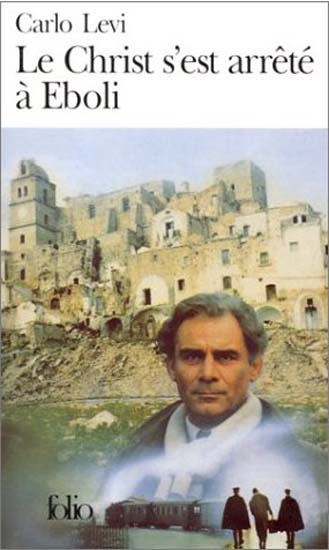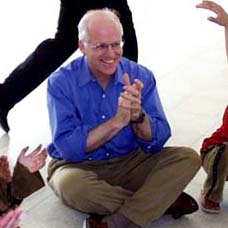
Carlo Levi presents a now-familiar story in "Christ Stopped at Eboli," that of an innocent westerner trying to live in, and to help, a remote peasant community. The title of the book comes from an expression by the people of Gagliano who say of themselves, “Christ stopped short of here, at Eboli” which means, in effect, that they feel they have been bypassed by Christianity, by morality, by history itself -- that they have somehow been excluded from the full human experience. He is a well-educated doctor, widely known in Italian and French cultural circles as a painter, now in confine, political exile, and thrust into a malaria-ridden backwater village in Lucania in the south of Italy. As a doctor, he can help the local people but other doctors in the region are jealous, as well as incompetent. Levi does what he can and, in the course of his story, describes the intricacies of village life and the lives of the villagers. Finally, of course, he had to leave. He went from southern Italy back to beautiful Florence and the ugly war and his work with the Resistance. But he did not forget Gagliano. He made this godforsaken place internationally important by writing a masterful and memorable book with the village and its citizens as its heroes and heroines. What more can a writer hope to do? John Coyne, editor of the "Peace Corps Writers" web site, served as a Peace Corps Volunteer in Ethiopia in the 1960's.
John Coyne writes: The first Peace Corps book
When Christ Stopped At Eboli
Last weekend, while I was at a small used bookstore called, appropriately enough, the Book Barn in rural Columbia County in upstate New York, I spotted on a shelf of this low-ceiling and cluttered store a copy of Carlo Levi’s Christ Stopped at Eboli. It’s a book that I hadn’t seen for forty years or more. In fact, I hadn’t seen a copy since I was a PCV in Ethiopia.
This book was one of about 250 paperbacks that Sarge Shriver and the Peace Corps put together in portable “booklockers” for 4000 of the first PCVs. The books were to be read and then left behind in our towns and villages and schools as seeds for new libraries in remote areas of the Third World.
The copy I found in the Book Barn was a Time Reading Program Special Edition, published in 1964. It was a trade paperback with a new preface, but the body of the book remained the same as the copy I had read years before. And what a body of prose it is.
First some background on Carlo Levi and Christ Stopped at Eboli for those of you who missed reading it while you were in college or overseas in the Peace Corps.
Carlo Levi was an Italian doctor and painter who had written polemics against Italy’s Fascist regime and was exiled in 1935 to Gagliano, a backward, malaria-ridden southern Italian village in Lucania.
Levi would spend a year in this village before returning to northern Italy in 1936, after he was freed with others in a general political amnesty.
The title of the book comes from an expression by the people of Gagliano who say of themselves, “Christ stopped short of here, at Eboli” which means, in effect, that they feel they have been bypassed by Christianity, by morality, by history itself -- that they have somehow been excluded from the full human experience.
Levi wrote Christ Stopped at Eboli eight years after the events he describes in his book, in 1943-1944 when he was living in Florence as a hunted member of the Underground. Some months later, he served as editor of a Resistance newspaper, La Nazione del Popolo, and in 1945 he went to Rome and edited another Resistance newspaper. Christ Stopped at Eboli was published in 1945.
I, along with a lot of other PCVs in those early years, first read it in 1962 when we discovered it in the Peace Corps booklocker.
In many ways, this memoir of Gagliano is the first real “Peace Corps book,” although a case can also be made for Nikos Kazantzakis’s Zorba the Greek, published in 1946. Levi presents a now-familiar story, that of an innocent westerner trying to live in, and to help, a remote peasant community. He is a well-educated doctor, widely known in Italian and French cultural circles as a painter, now in confine, political exile, and thrust into a malaria-ridden backwater village in Lucania in the south of Italy. As a doctor, he can help the local people but other doctors in the region are jealous, as well as incompetent. Levi does what he can and, in the course of his story, describes the intricacies of village life and the lives of the villagers. He tells of futile rivalries, casual sex, “pig doctors,” pompous officials, brigands, priests, and police. Some of the tales are haunting as he tries vainly to stop the dreaded malaria before the return of the mosquitoes, to care for women who come to him for medical advice in a region of Italy where, for example, the stethoscope is still unknown.
All of this is told in 25 short chapters in beautiful, quiet, unassuming prose. Here is the opening of one chapter: “It was September and the heat was giving way to promises of autumn. The wind came from a different direction; it no longer brought with it the burning breath of the desert, but had a vague smell of the sea. The fiery streaks of the sunset lingered for hours over the mountains of Calabria and the air was filled with bats and crows.”
When the word came that prisoners were to be released and he was free to return home from Gagliano, Levi found he could not leave. “Everyone else left the next morning,” he wrote, “but I could not bring myself to hurry. I was sorry to leave and I found a dozen pretexts for lingering on.” The peasants, he writes, came to tell him, “Don’t go away. Stay here. Marry Concetta. They’ll make you the mayor. You must stay with us.”
“I’ll come back,” Levi told them.
They shook their heads sadly. They knew they would never see him again.
“They wanted me to make a solemn promise to return and I made it in all sincerity, but I have not yet been able to keep it.”
I am not sure Carlo Levi ever returned to the village. I am not sure it is such a bad thing not to go back. The past is another country, as L.P. Hartley wrote years ago. Thomas Wolfe knew he couldn’t go home again, not even to Asheville, North Carolina.
Most memories should be left unchanged. Carlo Levi was smart enough to leave his memories unchanged by preserving them in prose, capturing his past forever in this memoir: true, touching and unblemished by time.
Should he have married Concetta and stayed in Gagliano, that backward, malaria-ridden southern Italian village, trying to help the people with his medical skills? Who is to say? If he had, he probably would have produced more beautiful paintings of the people and the landscape. And he probably would have written another book. But it would not have been this one.
Finally, of course, he had to leave. He went from southern Italy back to beautiful Florence and the ugly war and his work with the Resistance. But he did not forget Gagliano. He made this godforsaken place internationally important by writing a masterful and memorable book with the village and its citizens as its heroes and heroines. What more can a writer hope to do?
We should all be so gifted as to write such a wonderful book.
















